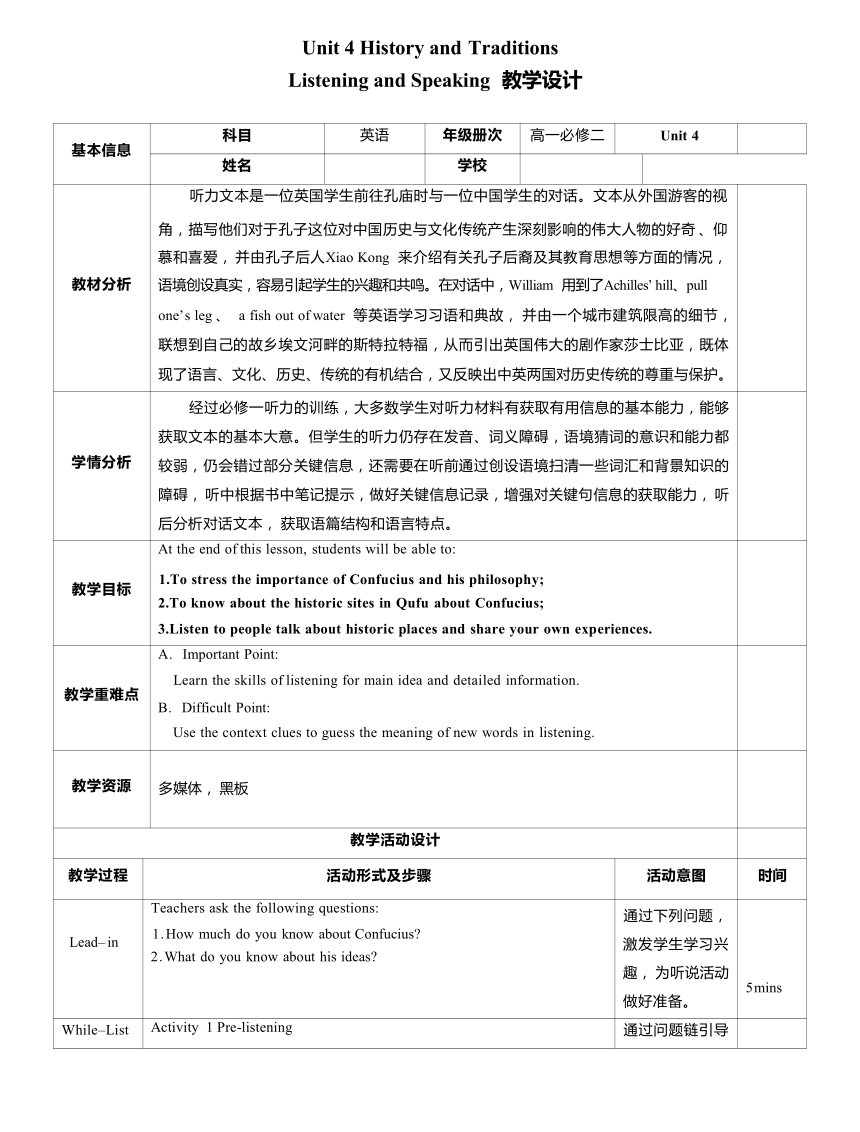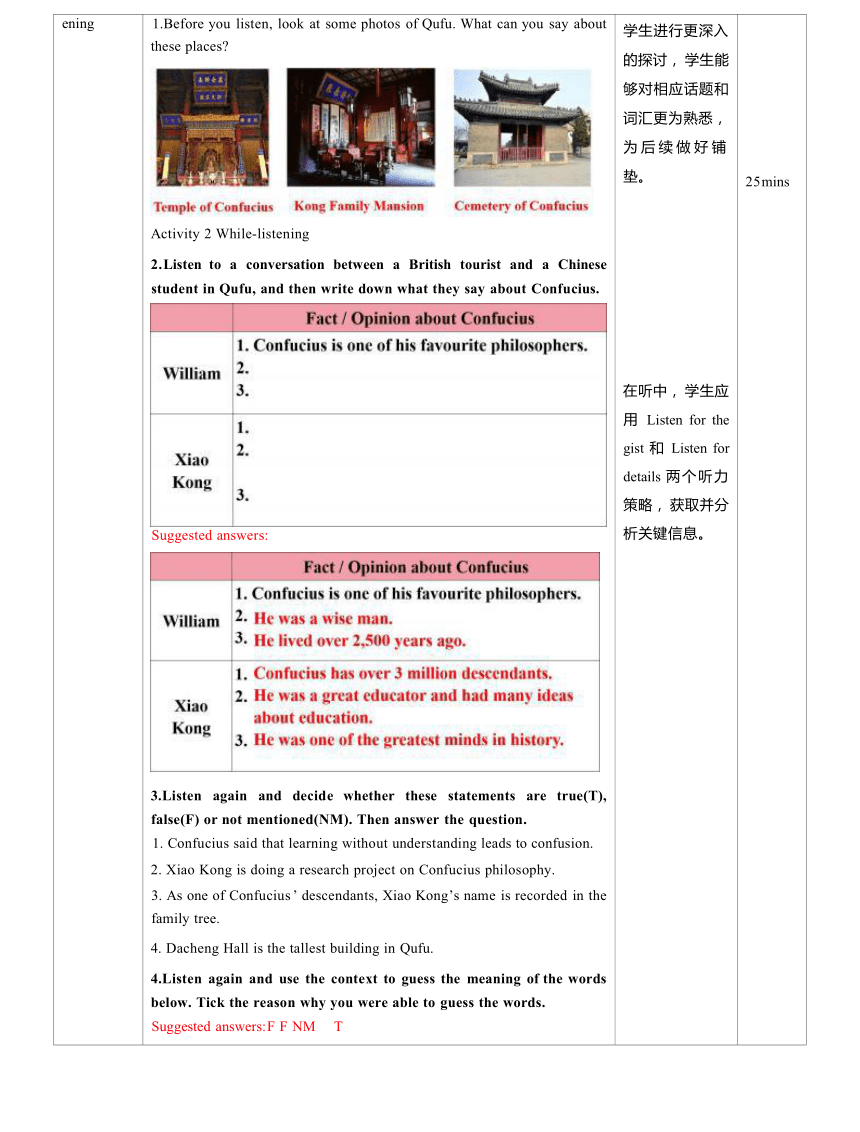人教版(2019)必修 第二册Unit 4 History and Traditions Listening and Speaking教学设计(表格式)
文档属性
| 名称 | 人教版(2019)必修 第二册Unit 4 History and Traditions Listening and Speaking教学设计(表格式) |

|
|
| 格式 | docx | ||
| 文件大小 | 95.8KB | ||
| 资源类型 | 教案 | ||
| 版本资源 | 人教版(2019) | ||
| 科目 | 英语 | ||
| 更新时间 | 2024-07-01 11:54:54 | ||
图片预览


文档简介
Unit 4 History and Traditions
Listening and Speaking 教学设计
基本信息 科目 英语 年级册次 高一必修二 Unit 4
姓名 学校
教材分析 听力文本是一位英国学生前往孔庙时与一位中国学生的对话。文本从外国游客的视 角,描写他们对于孔子这位对中国历史与文化传统产生深刻影响的伟大人物的好奇 、仰 慕和喜爱, 并由孔子后人Xiao Kong 来介绍有关孔子后裔及其教育思想等方面的情况, 语境创设真实,容易引起学生的兴趣和共鸣。在对话中,William 用到了Achilles’ hill、pull one’s leg 、 a fish out of water 等英语学习习语和典故, 并由一个城市建筑限高的细节, 联想到自己的故乡埃文河畔的斯特拉特福,从而引出英国伟大的剧作家莎士比亚,既体 现了语言、文化、历史、传统的有机结合,又反映出中英两国对历史传统的尊重与保护。
学情分析 经过必修一听力的训练,大多数学生对听力材料有获取有用信息的基本能力,能够 获取文本的基本大意。但学生的听力仍存在发音、词义障碍,语境猜词的意识和能力都 较弱,仍会错过部分关键信息,还需要在听前通过创设语境扫清一些词汇和背景知识的 障碍, 听中根据书中笔记提示,做好关键信息记录,增强对关键句信息的获取能力, 听 后分析对话文本, 获取语篇结构和语言特点。
教学目标 At the end of this lesson, students will be able to: 1.To stress the importance of Confucius and his philosophy; 2.To know about the historic sites in Qufu about Confucius; 3.Listen to people talk about historic places and share your own experiences.
教学重难点 A. Important Point: Learn the skills of listening for main idea and detailed information. B. Difficult Point: Use the context clues to guess the meaning of new words in listening.
教学资源 多媒体, 黑板
教学活动设计
教学过程 活动形式及步骤 活动意图 时间
Lead–in Teachers ask the following questions: 1.How much do you know about Confucius 2.What do you know about his ideas 通过下列问题, 激发学生学习兴 趣, 为听说活动 做好准备。 5mins
While–List Activity 1 Pre-listening 通过问题链引导
ening 1.Before you listen, look at some photos of Qufu. What can you say about these places Activity 2 While-listening 2.Listen to a conversation between a British tourist and a Chinese student in Qufu, and then write down what they say about Confucius. Suggested answers: 3.Listen again and decide whether these statements are true(T), false(F) or not mentioned(NM). Then answer the question. 1. Confucius said that learning without understanding leads to confusion. 2. Xiao Kong is doing a research project on Confucius philosophy. 3. As one of Confucius ’ descendants, Xiao Kong’s name is recorded in the family tree. 4. Dacheng Hall is the tallest building in Qufu. 4.Listen again and use the context to guess the meaning of the words below. Tick the reason why you were able to guess the words. Suggested answers:F F NM T 学生进行更深入 的探讨, 学生能 够对相应话题和 词汇更为熟悉, 为后续做好铺 垫。 在听中, 学生应 用 Listen for the gist 和 Listen for details 两个听力 策略, 获取并分 析关键信息。 25mins
Why do you think William said his hometown was similar to Qufu A. There are famous halls in his hometown. B. There are no tall buildings in his hometown. C. Both places have a famous person who was born there. D. His hometown doesn’t allow other buildings to be more noticeable than the historic buildings. Suggested answers:D 听力材料: Wiliam: Excuse me, do you speak English I'm looking for the Confucius Temple, but I’m not good at maps-they’re my Achilles ’ heel! Xiao Kong: Oh, hello, e with me-I’m going to the temple right now. By the way, what does “Achilles ’ heel” mean William: Oh, it means that something is my weakness-I'm really bad with maps! So do you know much about Confucius He's one of my favourite philosophers. He was such a wise man. Xiao Kong: Oh, yes. I was born here. In fact, I believe I am a descendant of Confucius himself. William: No way, you're pulling my leg, right So how do you know you're related to Confucius Didn't he live over 2,500 years ago Xiao Kong: Yes, but his family tree is well recorded. He has over three million descendants. Sorry again, what does “pulling my leg” mean William: Oh, sorry, it means to joke with someone. Anyway, so you're actually going to the temple to pay respects to your relative Xiao Kong: Well, yes. But I’m also meeting my study group there. We are doing a research project on Confucius ’ ideas on education. You know, Confucius was a great educator, and he had many great ideas about education. For example, he talked about the relationship between learning and reflecting. He believed that learning without reflecting leads to confusion … Oh, look, the temple is just over there. William: Oh, great! What's that big building over there Xiao Kong: Oh, that’s the famous Dacheng Hall. You know, it's so well-respected in Qufu that no other building in the city can be taller than it. William: Wow, now that’s respect. That’s a little bit like my hometown-Stratford-upon-Avon. Xiao Kong: Wait, you mean where Shakespeare was from What a coincidence-Confucius and Shakespeare, two of the greatest minds in history! I really want to visit the UK-I’m really interested in British history and culture.
William: Oh, that’s great! So later we can go for a cup of tea and have a chat about it. And it would be great if you could take me somewhere to get my watch fixed. Xiao Kong: OK, no problem! So come and meet my study group-we can tell you all about the temple. And how long are you staying in Qufu I can show you the Cemetery of Confucius and the Kong Family Mansion as well … William: Really That’s so kind! I need all the help I can get-I'm like a fish out of water!
Speaking Make a report of a cultural heritage. 1. What do you know about Confucius ’ideas on education Think of two or three examples. 2. What else do you know about Confucius and his philosophy Example: Education was one of Confucius ’ core values. He believed learning about the past would help us know the future. He also thought education helped bring peace and prosperity. He also thought it was important to use and apply what we have learnt in our education. 利用听力材料和 泛读文本的与主 题相关的词汇表 达进行对话练 习, 提高语言表 达能力, 培养学 生的表达能力, 提高学生的文化 意识 10mins
板书设计 Homework: 1.Read the listening material aloud. 2.Prepare an oral presentation about “An introduction of a historic site ”. 课后反思 通过学习: 1, 学生学习英语的信心增强; 2, 学生学会抓住听力中的答案; 3, 锻炼学生的口语能力! 通过本节内容学习, 理解并讨论主题图, 预测单元的主题和内容, 通过问题链引导学生谈论单 元内容, 该板块以听为本, 学生通过听取信息和选择依据来学习语言知识, 同时内化所学关 于本单元的内容 。 本课中运用了预测 、 小组讨论 、 列清单和情景模拟等搭建支架, 以保证学生学 习任务的完成。
Listening and Speaking 教学设计
基本信息 科目 英语 年级册次 高一必修二 Unit 4
姓名 学校
教材分析 听力文本是一位英国学生前往孔庙时与一位中国学生的对话。文本从外国游客的视 角,描写他们对于孔子这位对中国历史与文化传统产生深刻影响的伟大人物的好奇 、仰 慕和喜爱, 并由孔子后人Xiao Kong 来介绍有关孔子后裔及其教育思想等方面的情况, 语境创设真实,容易引起学生的兴趣和共鸣。在对话中,William 用到了Achilles’ hill、pull one’s leg 、 a fish out of water 等英语学习习语和典故, 并由一个城市建筑限高的细节, 联想到自己的故乡埃文河畔的斯特拉特福,从而引出英国伟大的剧作家莎士比亚,既体 现了语言、文化、历史、传统的有机结合,又反映出中英两国对历史传统的尊重与保护。
学情分析 经过必修一听力的训练,大多数学生对听力材料有获取有用信息的基本能力,能够 获取文本的基本大意。但学生的听力仍存在发音、词义障碍,语境猜词的意识和能力都 较弱,仍会错过部分关键信息,还需要在听前通过创设语境扫清一些词汇和背景知识的 障碍, 听中根据书中笔记提示,做好关键信息记录,增强对关键句信息的获取能力, 听 后分析对话文本, 获取语篇结构和语言特点。
教学目标 At the end of this lesson, students will be able to: 1.To stress the importance of Confucius and his philosophy; 2.To know about the historic sites in Qufu about Confucius; 3.Listen to people talk about historic places and share your own experiences.
教学重难点 A. Important Point: Learn the skills of listening for main idea and detailed information. B. Difficult Point: Use the context clues to guess the meaning of new words in listening.
教学资源 多媒体, 黑板
教学活动设计
教学过程 活动形式及步骤 活动意图 时间
Lead–in Teachers ask the following questions: 1.How much do you know about Confucius 2.What do you know about his ideas 通过下列问题, 激发学生学习兴 趣, 为听说活动 做好准备。 5mins
While–List Activity 1 Pre-listening 通过问题链引导
ening 1.Before you listen, look at some photos of Qufu. What can you say about these places Activity 2 While-listening 2.Listen to a conversation between a British tourist and a Chinese student in Qufu, and then write down what they say about Confucius. Suggested answers: 3.Listen again and decide whether these statements are true(T), false(F) or not mentioned(NM). Then answer the question. 1. Confucius said that learning without understanding leads to confusion. 2. Xiao Kong is doing a research project on Confucius philosophy. 3. As one of Confucius ’ descendants, Xiao Kong’s name is recorded in the family tree. 4. Dacheng Hall is the tallest building in Qufu. 4.Listen again and use the context to guess the meaning of the words below. Tick the reason why you were able to guess the words. Suggested answers:F F NM T 学生进行更深入 的探讨, 学生能 够对相应话题和 词汇更为熟悉, 为后续做好铺 垫。 在听中, 学生应 用 Listen for the gist 和 Listen for details 两个听力 策略, 获取并分 析关键信息。 25mins
Why do you think William said his hometown was similar to Qufu A. There are famous halls in his hometown. B. There are no tall buildings in his hometown. C. Both places have a famous person who was born there. D. His hometown doesn’t allow other buildings to be more noticeable than the historic buildings. Suggested answers:D 听力材料: Wiliam: Excuse me, do you speak English I'm looking for the Confucius Temple, but I’m not good at maps-they’re my Achilles ’ heel! Xiao Kong: Oh, hello, e with me-I’m going to the temple right now. By the way, what does “Achilles ’ heel” mean William: Oh, it means that something is my weakness-I'm really bad with maps! So do you know much about Confucius He's one of my favourite philosophers. He was such a wise man. Xiao Kong: Oh, yes. I was born here. In fact, I believe I am a descendant of Confucius himself. William: No way, you're pulling my leg, right So how do you know you're related to Confucius Didn't he live over 2,500 years ago Xiao Kong: Yes, but his family tree is well recorded. He has over three million descendants. Sorry again, what does “pulling my leg” mean William: Oh, sorry, it means to joke with someone. Anyway, so you're actually going to the temple to pay respects to your relative Xiao Kong: Well, yes. But I’m also meeting my study group there. We are doing a research project on Confucius ’ ideas on education. You know, Confucius was a great educator, and he had many great ideas about education. For example, he talked about the relationship between learning and reflecting. He believed that learning without reflecting leads to confusion … Oh, look, the temple is just over there. William: Oh, great! What's that big building over there Xiao Kong: Oh, that’s the famous Dacheng Hall. You know, it's so well-respected in Qufu that no other building in the city can be taller than it. William: Wow, now that’s respect. That’s a little bit like my hometown-Stratford-upon-Avon. Xiao Kong: Wait, you mean where Shakespeare was from What a coincidence-Confucius and Shakespeare, two of the greatest minds in history! I really want to visit the UK-I’m really interested in British history and culture.
William: Oh, that’s great! So later we can go for a cup of tea and have a chat about it. And it would be great if you could take me somewhere to get my watch fixed. Xiao Kong: OK, no problem! So come and meet my study group-we can tell you all about the temple. And how long are you staying in Qufu I can show you the Cemetery of Confucius and the Kong Family Mansion as well … William: Really That’s so kind! I need all the help I can get-I'm like a fish out of water!
Speaking Make a report of a cultural heritage. 1. What do you know about Confucius ’ideas on education Think of two or three examples. 2. What else do you know about Confucius and his philosophy Example: Education was one of Confucius ’ core values. He believed learning about the past would help us know the future. He also thought education helped bring peace and prosperity. He also thought it was important to use and apply what we have learnt in our education. 利用听力材料和 泛读文本的与主 题相关的词汇表 达进行对话练 习, 提高语言表 达能力, 培养学 生的表达能力, 提高学生的文化 意识 10mins
板书设计 Homework: 1.Read the listening material aloud. 2.Prepare an oral presentation about “An introduction of a historic site ”. 课后反思 通过学习: 1, 学生学习英语的信心增强; 2, 学生学会抓住听力中的答案; 3, 锻炼学生的口语能力! 通过本节内容学习, 理解并讨论主题图, 预测单元的主题和内容, 通过问题链引导学生谈论单 元内容, 该板块以听为本, 学生通过听取信息和选择依据来学习语言知识, 同时内化所学关 于本单元的内容 。 本课中运用了预测 、 小组讨论 、 列清单和情景模拟等搭建支架, 以保证学生学 习任务的完成。
